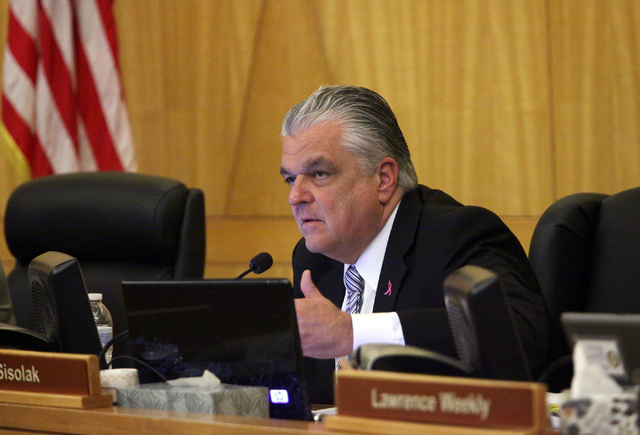Clark County reaches proposed contract with hospital employee union
Clark County and the union representing some 3,000 employees at University Medical Center have reached a proposed contract that gives workers three cost-of-living increases that will total a combined 5.5 percent during the next two years.
The Service Employees International Union Local 1107, which represents the bulk of nonmanagement staff at UMC, and the public hospital’s administration both say the agreement is fair and balances the hospital’s finances with its need to remain competitive and keep employees from being wooed by private-sector competitors.
But the contract still needs to pass muster with the Clark County Commission, which could make a decision on it as early as next week. Members of the SEIU who are UMC employees voted earlier this month to ratify the three-year agreement, with more than 99 percent supporting it.
The agreement, if approved, would cost an additional $10.9 million total during the life of the three-year contract, which covers July 1, 2013, through June 30, 2016.
The bulk of that amount, nearly $10 million, would go toward covering the cost-of-living increases: a 2 percent increase retroactive to Jan. 1, another 2 percent that starts in July, and a 1.5 percent increase in July 2015.
The agreement also ends the freeze on longevity pay increases and restores merit pay increases. Longevity pay typically gives employees a payment of 0.57 percent of their base salary, based on their years of service.
“The process in my opinion was very positive,” said Martin Bassick, president of SEIU Local 1107. “I want to say that UMC in the time I sat with them, their managers were very happy with the process. We worked together on a lot of issues.”
John Espinoza, chief human resources officer for UMC, represented the hospital in the bargaining. He said the process was aided by “interest-based bargaining,” which avoids having both parties immediately stake out positions. Instead, both parties to agree to what the issues are and talk together and brainstorm for solutions.
“It was a very difficult balance between trying to acknowledge our financial limitations but still maintain some sort of increase to make sure our employees are still coming close to market conditions,” Espinoza said, calling it reasonable considering employees have made concessions.
Espinoza said UMC needs to be competitive and keep its employees from leaving for more lucrative jobs in the private sector.
With this round of bargaining, Espinoza said a major concession on the union’s part was accepting a cost-of-living increase that wasn’t retroactive to July 1, the date the new contract kicks in. Instead, the first increase is retroactive only to Jan. 1.
The union made concessions during the recession, with workers taking a 2 percent pay cut in 2010. For UMC staffers, it amounted to a $4.4 million total reduction in pay and benefits for 2012 and 2013, records show.
Commission Chairman Steve Sisolak expressed concerns about the proposed contract allowing longevity pay to be in place for future new hires. While current employees should continue receiving it, Sisolak said there is a long-term cost for paying it in future years to new staffers.
“It’s millions of dollars,” Sisolak said. “It’s an expense that simply cannot continue.”
According to a county analysis, that cost would come to $155.5 million for longevity pay for a 30-year period for new, future UMC employees.
“This is for people that don’t even work here yet,” Sisolak said.
UMC has an operating deficit of $33.19 million projected for 2014.
The SEIU represents employees at UMC who aren’t physicians or management, and work in a variety of jobs, including nurses, secretaries, janitors and other support staff.
Contact reporter Ben Botkin at bbotkin@reviewjournal.com or 702-387-2904. Follow him on Twitter @BenBotkin1.




























